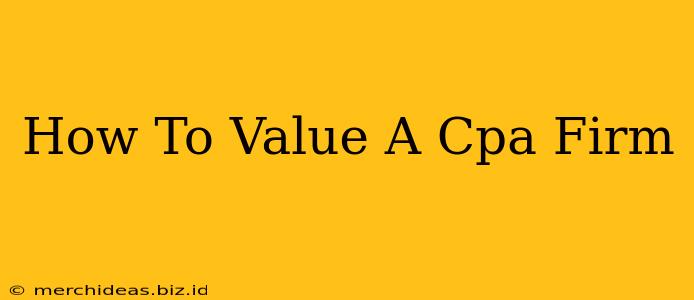Buying or selling a CPA firm is a significant financial decision. Understanding how to accurately value a CPA firm is crucial for both buyers and sellers to ensure a fair and equitable transaction. This comprehensive guide will walk you through the key methods and considerations involved in valuing a CPA firm.
Understanding the Factors Affecting CPA Firm Valuation
Several factors influence the value of a CPA firm. These can be broadly categorized as:
Financial Performance:
- Revenue: This is a fundamental factor. Higher revenue generally translates to higher value, but the quality of revenue (recurring vs. project-based, concentration of clients, etc.) is equally important.
- Profitability: Net income, operating income, and EBITDA (Earnings Before Interest, Taxes, Depreciation, and Amortization) are key indicators of a firm's profitability and its ability to generate cash flow. A consistently profitable firm commands a higher valuation.
- Growth Rate: A firm demonstrating consistent revenue and profit growth is more attractive to buyers and therefore more valuable. This growth should be sustainable and not just a one-off event.
- Client Concentration: Over-reliance on a few large clients presents risk. A diversified client base is generally preferred and increases valuation.
- Cash Flow: The ability of the firm to generate positive cash flow is a strong indicator of its financial health and value.
Intangible Assets:
- Reputation and Goodwill: A firm with a strong reputation and established client relationships will command a premium. This is difficult to quantify but significantly impacts value.
- Employee Skill and Expertise: The quality and experience of the firm's employees are crucial. A team of highly skilled professionals adds to the firm's value.
- Client Relationships: Strong, long-term relationships with clients are invaluable assets. These relationships represent recurring revenue and contribute to stability.
- Technology and Infrastructure: The firm's technology infrastructure, software, and systems influence efficiency and operational capabilities, impacting value.
Market Conditions:
- Economic Climate: The overall economic environment plays a significant role. A strong economy generally leads to higher valuations.
- Competition: The level of competition within the local market affects the firm's pricing power and ultimately its value.
- Industry Trends: Changes and trends within the accounting industry (e.g., increased automation, technological advancements) will impact valuation.
Valuation Methods for CPA Firms
Several methods can be used to value a CPA firm, each with its strengths and weaknesses:
Discounted Cash Flow (DCF) Analysis:
This method projects the firm's future cash flows and discounts them back to their present value. It's a comprehensive approach but requires detailed financial projections and assumptions about future growth rates and discount rates.
Market Approach:
This method compares the firm's valuation to similar firms that have recently been sold. Finding comparable transactions can be challenging, and the comparables may not be perfectly aligned.
Asset-Based Approach:
This method values the firm's net assets (assets minus liabilities). It's a straightforward approach but doesn't fully capture the firm's intangible assets, like goodwill and client relationships, which often represent a significant portion of its value.
Key Considerations for Accurate Valuation
- Engage a Qualified Appraiser: Hiring an experienced CPA firm valuation specialist is crucial for obtaining an objective and accurate valuation. They possess the expertise to navigate the complexities of the valuation process.
- Transparency and Documentation: Maintain detailed and accurate financial records. This will simplify the valuation process and ensure a smoother transaction.
- Negotiation and Agreement: Valuation is just one aspect of the transaction. Buyers and sellers need to negotiate and reach an agreement on the final price.
Conclusion: The Importance of Professional Guidance
Valuing a CPA firm is a complex process requiring expertise in accounting, finance, and valuation techniques. To ensure a fair and equitable transaction, seeking professional guidance from experienced advisors is highly recommended. This will not only provide you with an accurate valuation but will also help navigate the legal and financial aspects of buying or selling a CPA firm. Remember, a thorough understanding of the factors influencing value and the available valuation methods is critical for a successful outcome.
